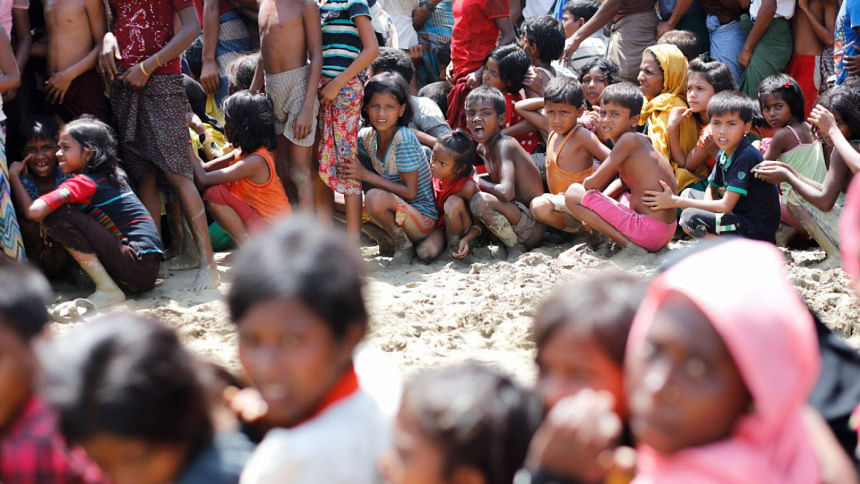Rohingya crisis and the China factor

In the ongoing Rohingya crisis, Bangladesh is in a position to play a critical role in the region. Bangladesh has gained worldwide recognition for its receptiveness to the now almost half a million refugees who have poured into the country. For Bangladesh, this is a historic opportunity—albeit under tragic circumstances—for conflict resolution and peace. If Qatar could become a world player in mediation in major conflicts like those of Sudan, Afghanistan, and Israel-Palestine, and earn its place in diplomacy, Bangladesh can also play a similar role in this region for its own interest as well as that of the region. The enormous burden of the refugees, and the security threat the massive influx poses, necessitate Bangladesh to adopt a long-term strategy. The Bangladesh government, opposition and civil society should all be united and step up to the plate to respond to the call.
China, India and the US all have economic interests in Myanmar—an extremely resourceful country in a strategic location—and large investments in the country, to make matters more complicated. The Rohingya crisis, though extremely costly in human terms, may bring the world powers together to find a sustainable solution as any other alternative could have devastating consequences.
If history is any reference, the most difficult and painful periods are followed by paradigm shifts in a positive direction. WWII helped bring about the present international order; the Cold War that posed an existential threat to humanity compelled the arch enemies—America, Soviet Union, and China—to engage in the visionary diplomacy of détente that helped transform these global enemies into global partners. Similarly, the Rohingya crisis may lead to the world powers coming together in order to avoid catastrophic outcomes that could potentially destabilise the entire region.
The terrain of mountains and heavy forest regions are most suitable for long-term guerilla warfare and are a breeding ground for terrorism—a serious security threat for the region. Furthermore, the atrocities against the Rohingya have created a fertile ground for rebellion and radicalisation. Add transnational terrorist networks in the mix, and things could get much more volatile. A vicious cycle of violence may set off as state-sponsored persecution of the Rohingya continues giving way to large numbers of recruits.
China, perhaps, has the biggest stake in Myanmar. In 2004, a massive natural gas field was found in Myanmar and in 2008, the China National Petroleum Corporation (CNPC) secured the rights to the natural gas. The construction of two 1,200km overland pipelines—one for gas and the other for oil—was undertaken. These pipelines run from Myanmar's Rakhine state to the Yunnan province of China, carrying gas and oil not only from Myanmar but also from the Middle East and Africa.
Considering these enormous, long-term benefits of China's strategic One Belt One Road initiative, China has an interest in addressing the discontent of Rakhine residents regarding the construction of the pipelines. That could minimise some of the consequences down the line. The vision clearly did not prevail among the Chinese leadership regarding Rakhine. The complaints and demands of Rakhine residents were simple: (i) river pollution and the decimated livelihood of local poor fishermen due to the pipeline construction; (ii) fair compensation for the properties expropriated for the project that CNCP did not compensate for as it had promised earlier; (iii) access to electricity for the areas that do not have this basic utility; and (iv) more jobs for the local workers.
China can still meet these demands. Thus in all likelihood China may urge the Myanmar government to take refugees back and uphold their basic human rights and fulfill their legitimate demands. Only China is in a position to make this happen. And Bangladesh can be instrumental towards that end.
China's policy in the region is changing, and it is defining its own national interest in terms of a long-range regional development goal. As the US is taking a more short-term, reactionary, neo-conservative, inward-looking and confrontational stand under the Trump administration, China, on the other hand, is taking a longer view of the future and prefers soft power diplomacy to establish its dominance in the region. Its One Belt One Road initiative is one which aims to advance the economy of the whole region in which China would remain a dominant integral part. China is readapting its policies and the last thing that China would want is a volatile region.
To salvage itself from being associated with such monstrous crimes, China may seek a way out of this quagmire by offering a process of resolution. The global outcry is not conducive to its greater goal of soft power diplomacy around the world. The distrust and cynicism among the people of the region are a hindrance to China's greater vision.
Let Bangladesh take the first step in calling for an international peace conference, either in Dhaka or in Beijing, and make all diplomatic and logistical preparations on its own to move forward. It may soon find that there is no shortage of friends and helpers in this grand pursuit of peace and justice. There is a general consensus that there is no military solution to such crises. The real issues of dissent and discontentment must be addressed. To achieve sustainable solutions to the Rohingya crisis, the focus should be to foster an inclusive environment and terms based on fairness.
Ruby Amatulla is Executive Director of the US-based Muslims for Peace, Justice and Progress, and the Bangladesh-based Women for Good Governance.





Comments